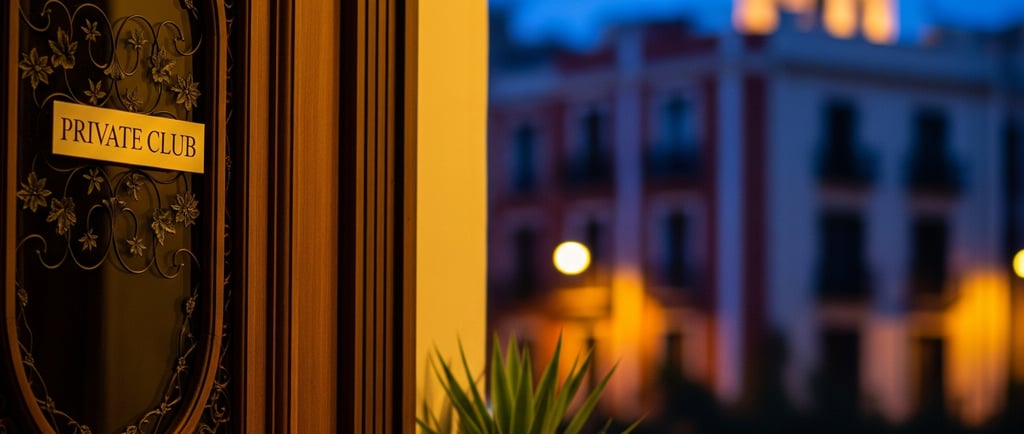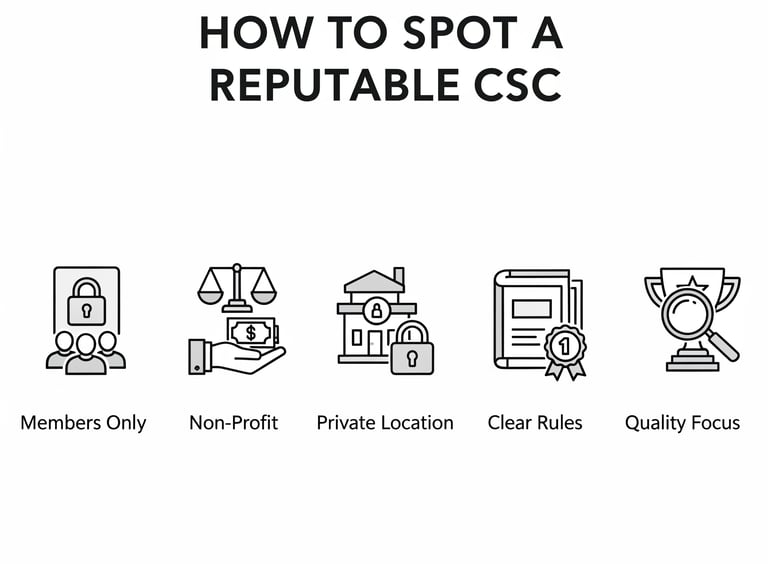The Complete Guide to Cannabis in Valencia (Spain): Social Clubs, Laws, and Safety 2025
Valencia, a sun-drenched jewel on Spain's Mediterranean coast, is celebrated for its stunning architecture, vibrant culture, and world-class cuisine. But beyond the City of Arts and Sciences and the bustling Mercat Central lies another burgeoning scene: a unique and often misunderstood cannabis culture. For tourists and new residents alike, navigating this landscape can be confusing. This article serves as your definitive, authoritative guide to understanding cannabis in Valencia for 2025, focusing on the legal, safe, and responsible way to engage with the city's private Cannabis Social Clubs.
CANNABIS CLUBS
7/9/20255 min read


What are Cannabis Social Clubs (CSCs) in Valencia?
First, let's clarify a crucial point: a Cannabis Social Club in Valencia is not a public coffeeshop like those in Amsterdam. Think of it less like a store and more like a private, non-profit cooperative or a member's-only wine club.
A CSC is a formally constituted association where members collectively organize the cultivation and distribution of cannabis amongst themselves in a private setting [1 - https://www.tni.org/en/publication/cannabis-social-clubs-in-spain]. The core principles are:
Privacy: The club is not open to the public. Only registered members can enter and participate.
Non-Profit: Money exchanged covers operational costs (rent, electricity, cultivation expenses), not to generate profit for owners.
Closed-Loop System: Cannabis is grown by or for the association, exclusively for its members. The goal is to create a "closed circle" from cultivation to consumption, avoiding the black market.
Harm Reduction: CSCs aim to provide a safe environment with access to products of known origin, away from the risks of street dealing.
This model exists in a unique legal space, fundamentally different from the commercial, state-licensed dispensaries you might find elsewhere.
The Legal Landscape of Cannabis in Spain and Valencia
Understanding the law is paramount. Spain's cannabis legislation is a delicate balance of decriminalization and prohibition.
✅ Private Consumption is Decriminalized: It is not a criminal offense for an adult to possess or consume small quantities of cannabis in a private space (like your home or inside a CSC) [2 - https://www.emcdda.europa.eu/countries/drug-reports/2024/spain/drug-laws-and-drug-policy_en]. This legal tolerance is the foundation upon which CSCs are built.
❌ Public Consumption/Possession is Illegal: Being caught with or consuming cannabis in public spaces (streets, parks, beaches) is a serious administrative offense, punishable by significant fines (often starting from €601) and confiscation of the substance under Spain's Organic Law 4/2015, the "Ley Mordaza" [3 - https://www.boe.es/buscar/act.php?id=BOE-A-2015-3442].
❌ Buying and Selling is a Crime: The sale and trafficking of cannabis are criminal offenses under the Spanish Penal Code [4 - https://www.boe.es/buscar/act.php?id=BOE-A-1995-25444]. This is why purchasing from street dealers is not only risky but illegal.
CSCs operate within this framework by being private spaces where consumption is decriminalized for its members.
How to Become a Member of a CSC in Valencia: A Step-by-Step Guide
Joining a legitimate CSC requires a formal process designed to protect the club and its members. Here’s what you generally need to know:
Meet the Requirements:
Age: You must be an adult, typically 18 or 21 years old, depending on the club's statutes.
Identification: A valid, government-issued photo ID is mandatory (Passport, DNI/NIE).
Residency: Most reputable clubs require proof of residency in Spain. This is a key point that separates CSCs from tourist-oriented businesses.
Referral/Sponsorship: You almost always need an invitation from an existing member. Clubs are private associations and do not typically accept walk-ins.
The Registration Process:
Once you have a sponsor, you'll schedule an appointment.
You will have a brief orientation about the club's rules, philosophy, and legal standing.
You will sign a membership agreement, formally joining the association.
An annual membership fee is required to cover administrative costs. This fee does not pay for cannabis itself.
📌 Crucial Advice for Tourists: The CSC model is not designed for tourists. While some clubs may bend these rules, it is not the norm for reputable establishments. Avoid street promoters who promise easy access; they often lead to scams or non-compliant clubs. If you are a tourist, understand that there is no fully legal, established channel for you to purchase or consume cannabis in Valencia.
What to Expect Inside a Social Club
The atmosphere inside a Valencia CSC can vary greatly, but well-run clubs often feel like a relaxed private lounge.
Atmosphere: Expect a comfortable, safe, and social environment. Many clubs have couches, tables, Wi-Fi, music, and sometimes offer coffee or snacks. It's a place to socialize with like-minded people.
The "Budtender": The person at the dispensary counter is more than a cashier; they are a key part of the association. They can advise on available strains, their effects, and help you understand the club's products.
Products: You'll typically find a variety of cannabis flower, hashish, and sometimes extracts or edibles. The quality can be very high, as the club's reputation depends on it.
Club Etiquette: Discretion is key. Be respectful of other members and the staff. Do not take photos without permission, and never discuss reselling or taking large quantities outside the club.
A Look at Leading Cannabis Clubs in Valencia
While providing a definitive "best of" list is impossible and subjective, several clubs in Valencia are frequently mentioned in public guides and online communities for their reputation and commitment to the CSC model. When researching, look for clubs that emphasize their private, non-profit nature and have clear, transparent membership requirements. Establishments often cited in guides include Clouds Valencia, Alice Valencia, Trico Valencia, and Veintiuno. The key to finding a good club is to look for one that prioritizes its members' well-being and operates discreetly and professionally, rather than one that advertises openly.
Cannabis Culture and Tourism in Valencia
The unique legal situation has given rise to a niche tourism culture. Some specialized tour operators offer guided introductions to the cannabis scene, which can sometimes facilitate a proper introduction to a club for those planning a long-term stay. Additionally, a culture of responsible consumption is paramount. The community values discretion and respect for both the laws and the non-consuming public.
Valencia, Spain vs. Valencia, California: An Important Distinction
To avoid any confusion for international searchers, it's vital to understand the difference:
Valencia, SPAIN: Cannabis access for residents is through private, non-profit social clubs (CSCs). There are no public retail stores.
Valencia, CALIFORNIA (USA): Cannabis is recreationally legal and sold through state-licensed, for-profit retail dispensaries and delivery services. These are public businesses you can walk into with an ID.
The two models are entirely different. This guide refers exclusively to Valencia, Spain.
Frequently Asked Questions (FAQ)
Q: Is cannabis legal for recreational use in Valencia? A: It's nuanced. Consumption in private spaces (like a home or CSC) is decriminalized. Public consumption, possession, and all forms of sale are illegal.
Q: Can I just walk into a cannabis club in Valencia and buy weed? A: No. CSCs are private clubs. You must be a registered member, which typically requires residency and a referral. They are not public shops.
Q: How much does it cost to join a CSC? A: Membership fees vary by club but are usually an annual payment ranging from €20 to €50. This fee covers membership only, not the cannabis itself.
Q: Can I take cannabis I get from a club out onto the street? A: No. This would be considered public possession, which is illegal and can result in fines. Cannabis acquired in a club should be consumed on the premises.
Q: What is the difference between a CSC in Valencia and a coffeeshop in Amsterdam? A: Amsterdam coffeeshops are public, commercial businesses licensed to sell cannabis. Valencian CSCs are private, non-profit associations that share cannabis only among their registered members.
Conclusion
Valencia's cannabis scene offers a fascinating model built on privacy, community, and a unique interpretation of Spanish law. For residents, Cannabis Social Clubs provide a structured and potentially safer alternative to the black market. For visitors, however, the message is one of caution and respect for local laws. The key to a positive experience is understanding that discretion, responsibility, and adherence to the private club model are paramount. This guide has provided you with the foundational knowledge to navigate this world safely and responsibly.
Enjoyed this guide? Share it with others or subscribe to our newsletter for more in-depth articles on culture and travel in Valencia!


